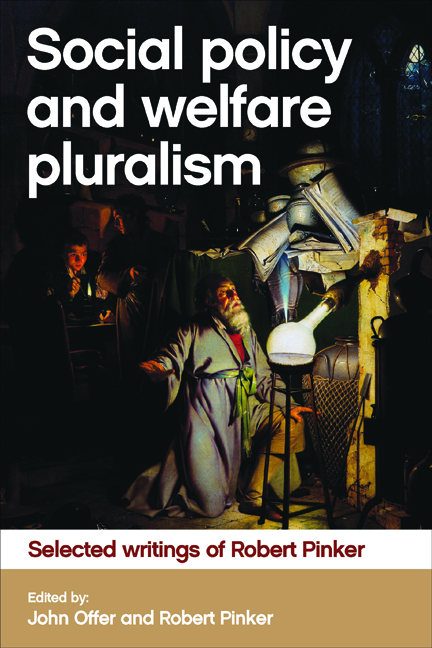Book contents
- Frontmatter
- Contents
- Acknowledgement
- Preface
- General introduction: Robert Pinker on rethinking approaches to welfare
- Introduction to Part One On social policy studies
- one The ends and means of social policy: a personal and generational perspective
- two Social theory and social policy: a challenging relationship
- three Stigma and social welfare
- four The welfare state: a comparative perspective
- five Richard Titmuss and the making of British social policy studies after the Second World War: a reappraisal
- Introduction to Part Two On social care, communities and the conditions for well-being
- six Report of the Working Party on the Role and Tasks of Social Workers: an alternative view
- seven The quest for community: from the Settlement Movement to the Griffiths Report: an historical perspective
- eight Citizenship, civil war and welfare: the making of modern Ireland
- Introduction to Part Three On welfare pluralism
- nine Golden Ages and welfare alchemists
- ten From gift relationships to quasi-markets: an odyssey along the policy paths of altruism and egoism
- eleven The experience of citizenship: a generational perspective
- twelve The right to welfare
- thirteen The prospects for social policy in the UK after the 2015 General Election
- Afterword On the post-Brexit prospects for social policy in the UK
- References
- Index
General introduction: Robert Pinker on rethinking approaches to welfare
Published online by Cambridge University Press: 08 April 2022
- Frontmatter
- Contents
- Acknowledgement
- Preface
- General introduction: Robert Pinker on rethinking approaches to welfare
- Introduction to Part One On social policy studies
- one The ends and means of social policy: a personal and generational perspective
- two Social theory and social policy: a challenging relationship
- three Stigma and social welfare
- four The welfare state: a comparative perspective
- five Richard Titmuss and the making of British social policy studies after the Second World War: a reappraisal
- Introduction to Part Two On social care, communities and the conditions for well-being
- six Report of the Working Party on the Role and Tasks of Social Workers: an alternative view
- seven The quest for community: from the Settlement Movement to the Griffiths Report: an historical perspective
- eight Citizenship, civil war and welfare: the making of modern Ireland
- Introduction to Part Three On welfare pluralism
- nine Golden Ages and welfare alchemists
- ten From gift relationships to quasi-markets: an odyssey along the policy paths of altruism and egoism
- eleven The experience of citizenship: a generational perspective
- twelve The right to welfare
- thirteen The prospects for social policy in the UK after the 2015 General Election
- Afterword On the post-Brexit prospects for social policy in the UK
- References
- Index
Summary
Introduction
Robert Pinker began writing on social policy in the 1960s, when the publications of Richard Titmuss at the London School of Economics (LSE) were the dominant influence on the study of social policy in the UK. He is still writing on social policy today. His earliest research work concerned the development of health care within the poor law (with Brian Abel-Smith) and also, with Peter Townsend, the experiences of the staff and ‘inmates’ of local authority ‘care homes’ for elderly people, into which form many former poor law institutions had mutated (see Johnson et al, 2010). When his Social Theory and Social Policy appeared in 1971, it rapidly became essential reading where social policy or ‘social administration’ was studied, influencing students for many years. As Anthony Forder noted, Social Theory and Social Policy ‘was the first major British book in the field of social administration to examine the theoretical perspectives underlying the study of the subject’ (Forder et al, 1984: 230). Two further books were published devoted to social policy, The Idea of Welfare (1979) and Social Work in an Enterprise Society (1990), together with many articles on complementary topics.
Pinker's overarching concern was to rethink the study of social policy, drawing initially and in a general sense on the non-structuralist and phenomenological sociological perspectives explored in Berger and Luckmann (1966). Although the teaching of sociology and social administration was often, if sometimes uneasily, the responsibility of one department in universities at the time, Pinker's Social Theory and Social Policy was the first book to map what the ‘sociology of welfare’ might study (what the sociology of religion comprised, for instance, was by comparison already well established). It was also the first to assess the potential of classical theorists (Durkheim, Spencer, Marx and Weber in particular and, to a lesser extent, Simmel) to contribute to the development of the specialism, and the first to criticise from a sociologically informed position the traditional range of topics taught and investigated within social policy studies. Pinker's criticisms followed three guiding principles. First, a focus in the study of welfare and policy on the ‘welfare state’ was not in itself sufficient. Second, ‘theory’ should not be confused with ideology or rhetoric.
- Type
- Chapter
- Information
- Social Policy and Welfare PluralismSelected Writings of Robert Pinker, pp. 1 - 24Publisher: Bristol University PressPrint publication year: 2017

